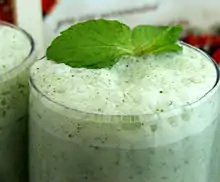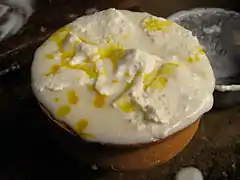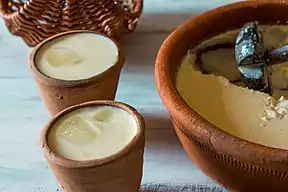Lassi
Lassi (pronounced [ləsːi]) is a popular traditional dahi (yogurt)-based drink that originated in Punjab, India.[1] Lassi is a blend of yogurt, water, spices and sometimes fruit. Namkeen (salty) lassi is similar to doogh, while sweet and mango lassis are like milkshakes. Lassi may be infused with cannabis in the form of bhang. Chaas is a similar drink of a thinner consistency.
 Lassi serving | |
| Alternative names | Lachhi, taak, chhah |
|---|---|
| Course | Beverage |
| Place of origin | Indian subcontinent |
| Associated national cuisine | Cuisine of the Indian subcontinent |
| Serving temperature | Chilled |
| Main ingredients | Dahi (yogurt), cream, water and spices |
| Variations | kachi lassi |
Variations
Traditional namkeen (salty) lassi
The traditional namkeen (or salty) form of lassi is more common in the Indian subcontinent. It is prepared by blending dahi (yogurt) with water with added salt. The resulting beverage is known as salted lassi. This is similar to doogh.
Sweet lassi
Sweet lassi is a form of lassi flavoured with sugar, rosewater or lemon, strawberry or other fruit juices. Saffron lassis, which are particularly rich, are a specialty of Rajasthan and Gujarat in India and Sindh. Makkhaniya lassi is simply lassi with lumps of butter in it (makkhan is the Gujarati, Urdu, Hindi, Sindhi and Punjabi word for butter). It is usually creamy like a milkshake.
Mango lassi
Mango lassi is made from yogurt, milk and mango pulp, and may contain added sugar. It is commonly served cold using sweetened kesar mango pulp mixed with yogurt, cream, or ice cream.
Bhang lassi

Bhang lassi is a cannabis-infused drink that contains bhang, a liquid derivative of cannabis, which has effects similar to other eaten forms of cannabis.[2] It is legal in many parts of India and mainly sold during Holi, when pakoras containing bhang are also sometimes eaten. Uttar Pradesh is known to have licensed bhang shops, and in many places, one can buy bhang products and drink bhang lassis.[3]
Chaas
Chaas is a salted drink similar to lassi, but may contain more water than lassi and has the butterfat removed to reduce its consistency. Salt, cumin seeds or fresh coriander may be added for taste. Fresh ground ginger and green chillies may also be added as seasoning. Chaas is popular in India where it is a common beverage during or after mealtime.
Cultural references

A 2008 print[4] and television[5][6] ad campaign for HSBC, written by Jeffree Benet of JWT Hong Kong, tells a tale of a Polish washing machine manufacturer's representative sent to India to discover why their sales are so high there. On arriving, the representative investigates a lassi parlor, where he is warmly welcomed, and finds several washing machines being used to mix it. The owner tells him he is able to "make ten times as much lassi as I used to!"
On his No Reservations television program, celebrity chef Anthony Bourdain visited a "government authorised" bhang shop in Jaisalmer Fort, Rajasthan. The proprietor offered him three varieties of bhang lassi: normally strong; super duper strong; and "full power, 24 hours, no toilet, no shower".
In 2013, Kshitij, the annual techno-management fest of IIT Kharagpur, launched a campaign to name the next version of the mobile operating system Android, Lassi.[7]
See also
| Wikibooks Cookbook has a recipe/module on |
References
- "Lassi". Encyclopædia Britannica.
- Staelens, Stefanie. "The Bhang Lassi Is How Hindus Drink Themselves High for Shiva". Vice.com. Retrieved August 10, 2017.
- Anthony Bourdain: No Reservations Collection 2, Episode 5; Final Segment.
- "Can This Lassi Ad Really Be True?". indiablogs.searchindia.com. 2008-10-04.
- "HSBC Bank : Washing Machine and Lassi". Adoholik. 2008-09-27. Retrieved 2008-10-19.
- "HSBC Lassi/Washing Machines TV Ad". HSBC. 2012-04-30. Retrieved 2013-09-23.
- TOI Tech Sep 11, 2013, 06.56PM IST (2013-09-11). "IIT grads plead Google to name Android version Lassi - Times Of India". Articles.timesofindia.indiatimes.com. Retrieved 2014-01-08.CS1 maint: multiple names: authors list (link)







